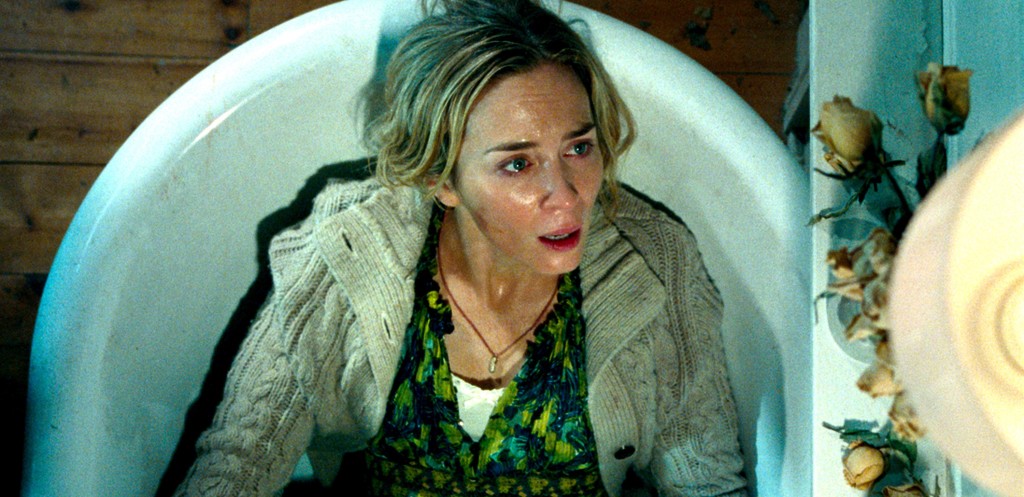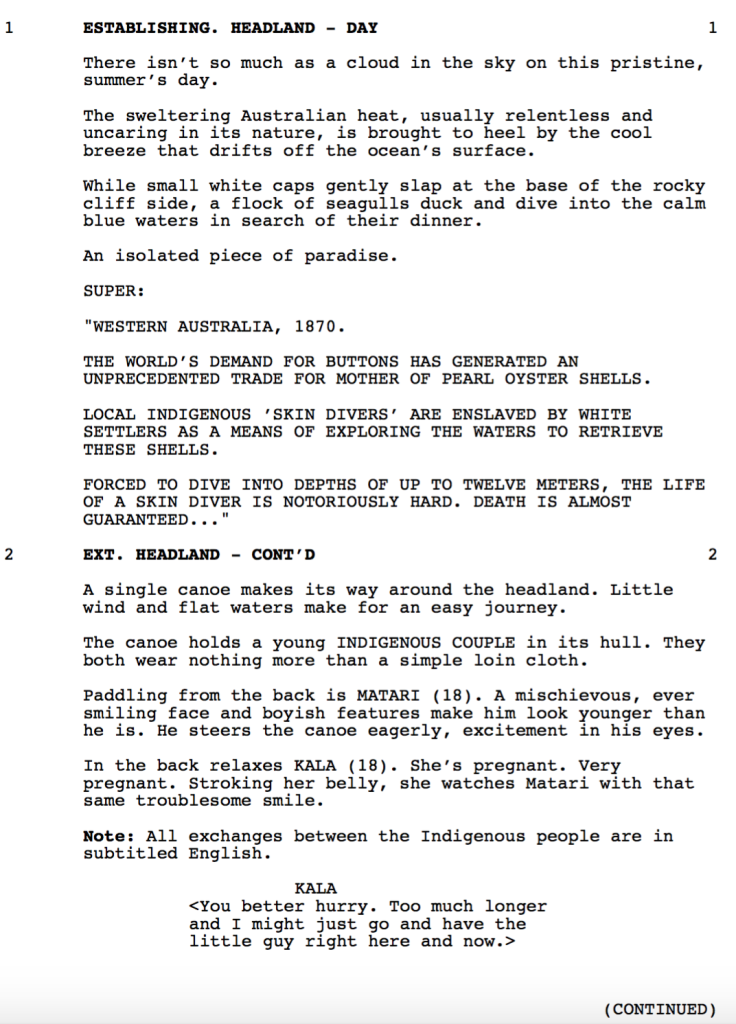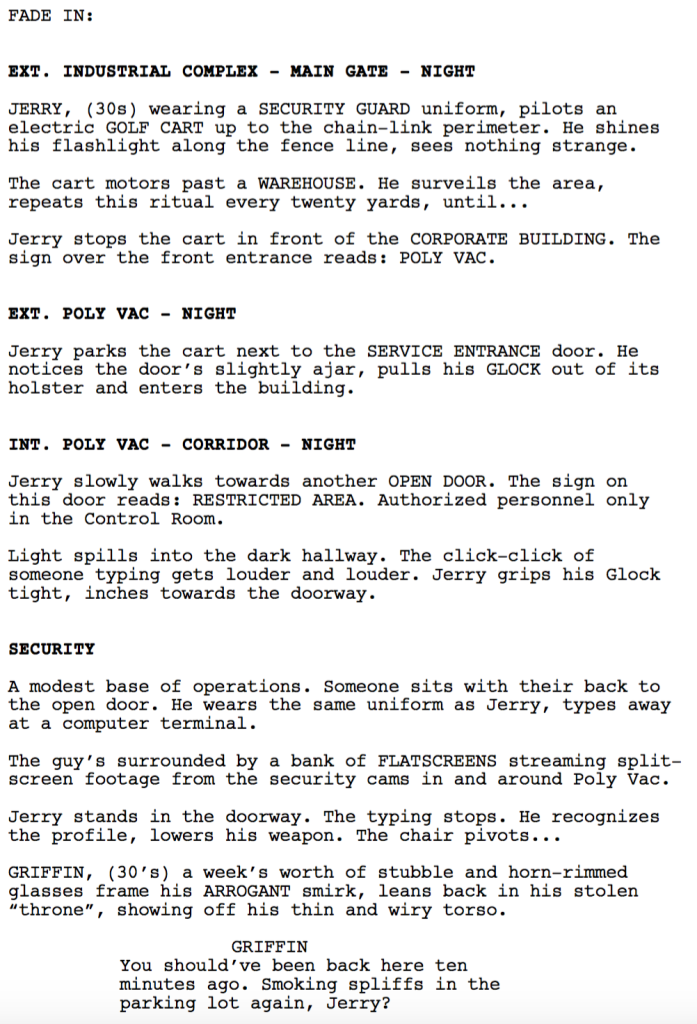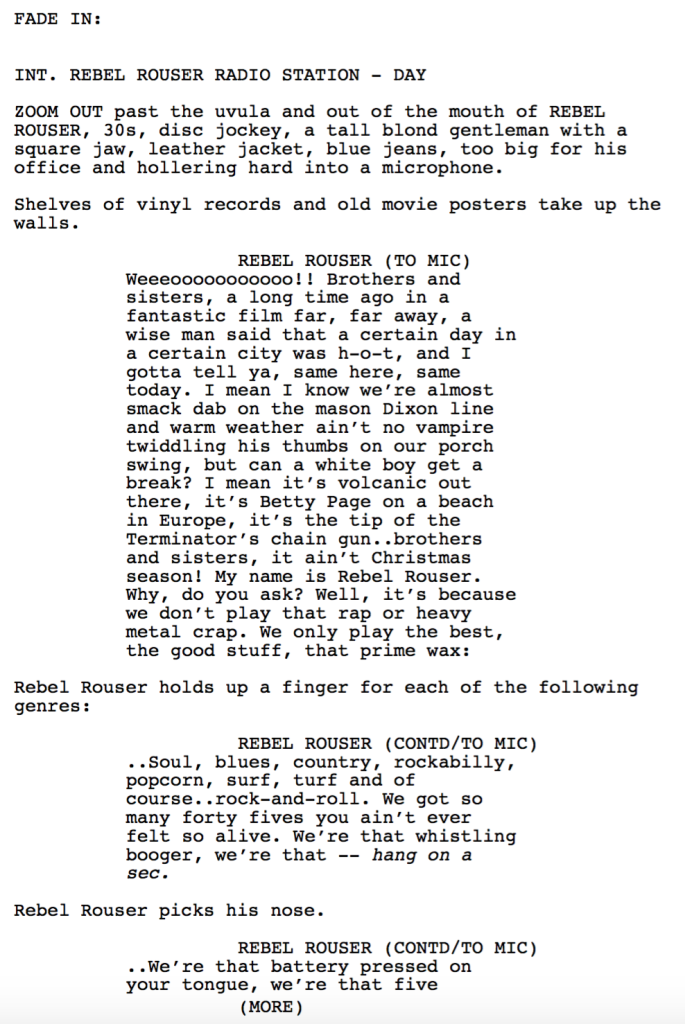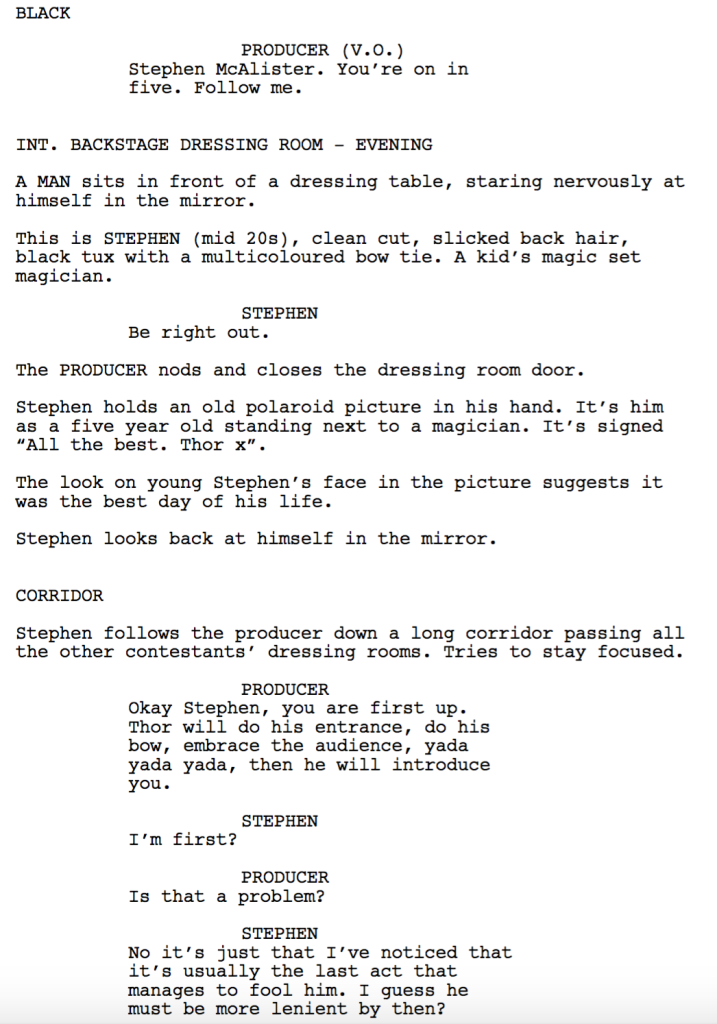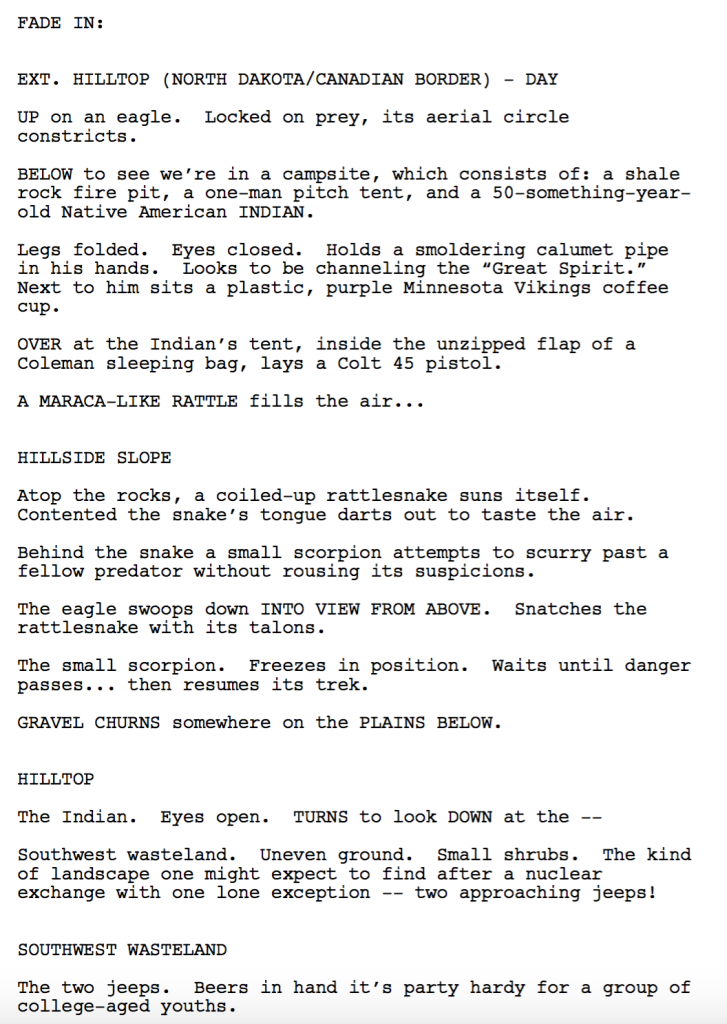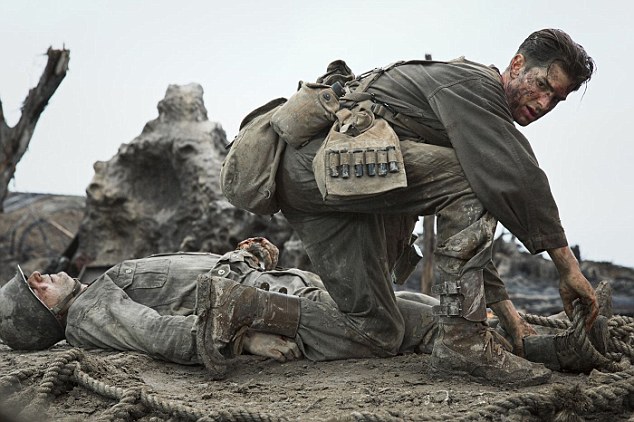Genre: Sci-Fi
Premise: A janitor on an off-world secret prison is tasked with helping the prison’s biggest criminal escape or his family dies.
About: Today’s writer is one of the few out there who can say he’s sold a spec for 7 figures. Sascha Penn is known as a writer with lots of fun sci-fi ideas and sold this script, The Ditch, to Warner Brothers in 2009.
Writer: Sascha Penn
Details: 4/9/09 draft – 120 pages
I tried to get myself up to the Arclight to see Coco this weekend but there was something about the film that wouldn’t allow me to justify the $20 cost. Studios have to be careful right now. I’ve seen them up the prices across the board in both theaters and home rental. I’ve noticed that those extra few bucks have made me much more likely to think through a purchase. This isn’t a good time for the industry to be doing this. They need more people watching movies. Not less.
I begrudgingly opted instead for Atomic Blonde, hoping my instincts about the film were wrong (it looked cold and inaccessible). But they turned out to be dead on. The film was cold and inaccessible. Seems like the director forgot what made John Wick so good. The fun factor. There was zero fun factor in this movie, a grim action piece with perfectly choreographed fights and slick cinematography, hampered by a main character who was as fun to root for as a bully at a chess meet. It continues to prove my theory that the Cold War is one of the worst subject matters to base a movie around. There have been like 2 good Cold War movies in the past half-century. And that’s being generous.
My weekend felt like it was heading towards failure until I got one of those pleasant surprises – a kick-ass consultation script. It was a Western from a Canadian writer who’d injected the very thing Atomic Blonde was missing – FUN! I was hoping to go 2 for 2 on the script front with this sci-fi offering. Let’s see if I scored.
The year is 2119 A.D., a year where they still need, unfortunately, janitors. Which is what our main character, Jake Pryor, is. Jake’s occupation is a sore spot for his family – his wife, teenager daughter, and newborn – but at least they get to experience the pioneer life, living on Ganymede, Jupiter’s largest moon.
Jake is a janitor at The Ditch, a giant prison outside of Ganymede’s main city. This mega-prison houses over 500,000 prisoners and 125,000 employees. And Jake’s under the impression that when he shows up at work, it’s going to be just another day of cleaning.
Boy is he wrong. Armstrong Praxis, the most ruthless terrorist on earth since Osama Bin Laden, has been sent to The Ditch to be executed, old-school style (electric chair), today! Jake senses something’s off when, while passing Praxis, Praxis asks how his wife is doing – BY NAME. Yeah, that’s never a good sign.
Jake is then contacted by some ex-workers, who inform him that they’re holding his family hostage. And if he doesn’t rescue Praxis and get him out of that prison, they’re all going to die.
With time-a-tickin’, Jake blows the main fuse to the building and manages to intercept Praxis’s escort back to his cell. After beating some ass (you knew this guy wasn’t always a janitor, right?), he leads Praxis through a series of back-alley rooms in the prison he knows so well, and out to safety. But will they be caught before they can get back to the city? And will Jake’s family become a casualty after all?
The Ditch is a cool, if standard, sci-fi script.
You’re not going to get anything too imaginative here. And that’s a reality of the genre. There isn’t a genre more copied than sci-fi. That’s why, if you’re one of those unique talented sci-fi writers who can come up with a bunch of shit that nobody’s ever seen before? You WILL work in this industry. Because all I see? And all anybody sees? Is sci-fi writers regurgitating the same four movies – Terminator, Aliens, Star Wars, and The Matrix.
I’ll give you a scene from The Ditch, though, that got my originality vote.
Penn cleverly sets up a main elevator that is the only elevator serving the entire prison tower. This elevator is so smart, it can actually detect extra heartbeats. So if an employee signs into the elevator but there is a second person that isn’t checked in, the elevator won’t move.
Well, there’s a moment where Jake has to use the elevator to take Praxis down to the first floor. So he tells Praxis to take these pills that basically kill him, and he’ll revive him once they get to the bottom. Keep in mind, it’s been made clear to Jake that if Praxis dies, his family will be killed.
We establish that Praxis can be dead for maybe 3 minutes before he has to be resuscitated, which happens to be the same amount of time the ride will take. So they initiate the plan, but because the building is still reeling from the earlier power outage, the elevator is only moving at 40% speed.
It’s a great little tense scene, with some lovely irony in it to boot. Paxis was brought here to be killed. But Jake’s whole world depends on bringing Paxis back to life.
If you can come up with 4 or 5 scenes like this in a single sci-fi film? People WILL make your movie. Only because it’s so rare that you get scenes that are actually original in science-fiction. It’s usually people shooting lasers at each other or driving futuristic cars after one another. You have to be crafty. You have to be clever.
The rest of the script never reached the heights of that scene but the setup was strong enough to keep me engaged. In these situations, if you give us a main character we care about and you give us a family (or wife) who needs to be saved that we care about as well, even if you execute a ho-hum plot, we’ll still be invested because we want to see the characters survive.
In no movie is this better proven than Die Hard. Die Hard is a super generic premise. Terrorists take over a building. But we love John McClane. And even though we met his wife for only a couple of scenes, we love her too. So we want to see them survive and be together again.
Just think if you could do both these things? Write an insanely original sci-fi script with characters we love and want to see survive? You’d freaking clean up. You’d be getting checks in the mail for the rest of your life.
Easy right? :)
[ ] What the hell did I just read?
[ ] wasn’t for me
[x] worth the read
[ ] impressive
[ ] genius
What I learned: Judgeable Moments – There are moments in a script where the reader is judging the writing heavily. These are moments that shine a light on just how hard the writer is trying. I know if the writer nails that moment, they’re giving it their all. In The Ditch, there’s a moment right before Paxis is about to be executed, when the warden asks him, “Any last words?” Now think about that for a second. As a writer, this is one of the highest honors you can take on. You are crafting the LAST WORDS a human ever thinks they’re going to say. This is not something to take lightly. You need to come up with a line that’s not only powerful and memorable, but that encapsulates everything that character is. You have some understanding of who Paxis is. What last words would you write for him? Because I’ll tell the last words that were chosen. They were: “Fuck all of you.” I don’t know about you? But that’s the most generic line that could’ve been chosen. And I say that because ANY CHARACTER could’ve said it. There’s nothing unique about it. To bolster this point, think about what Darth Vader would’ve said here. Or Hannibal Lecter. Or Annie Wilkes. Or Nurse Ratched. Or The Joker. Or Gollum. Their answers would’ve been entirely unique to their character. Which is why I need for these moments in a script to be perfect. Because they’re the moments that highlight your writing. So, I ask you. What line would have you chosen for Paxis’s last words?
Just the tips!
It’s Thanksgiving Week, which means it’s time to sneak away from people you’re convinced you can’t possibly be related to to work on your script! Thought I’d give you some help. Here are ten screenwriting tips I’m thankful for. Feel free to share the tips you’re thankful for in the comments section!
1) Nothing should ever go according to plan.
2) Have characters keep lies from one another. Their dialogue is a lot more interesting that way.
3) A simple disagreement can turn an ordinary scene into a good one.
4) Without a worthy villain, your hero’s journey will feel too easy.
5) Characters shouldn’t be talking about the past or the future. They should be dealing with the present.
6) Every solution in your hero’s journey should come at a cost.
7) Send your character into the place they least want to go.
8) A great character-creation hack is to give your character a primary trait that’s opposite of who they appear to be. A soft-spoken boxer. A pissy nun. An anxiety ridden yoga teacher. A jerky ice-cream truck driver.
9) Never underestimate the power of anticipation – there’s a reason they don’t start you on the top of the roller coaster. They make you go up that hill first.
10) A story only begins once there’s a problem.
Welcome to the newest trend in screenwriting, the “micro-screenplay!”
Genre: Horror/Post-Apocalypse
Premise: A farming family must communicate without speech in order to avoid a violent creature which seeks out its prey via sound.
About: For those of you who think the only way to break into Hollywood is to have an Oscar-winning producer as an uncle, look no further than Scott Beck and Bryan Woods, graduates of University of Iowa, a state with plenty of uncles, but no Hollywoods! Beck and Woods are filmmakers who have been slowly moving their way up the ladder, finally selling this script to Paramount for John Krasinski and wife, Emily Blunt, to star in. While Krasinski would later do a pass on the script (he’s also directing), this is the spec that sold before his involvement.
Writers: Scott Beck & Bryan Woods
Details: 67 pages
Say it with me now. Miiiiiiiii-cro screenplay.
It’s the new trend, brother. Haven’t heard of it? Where have you been? Off writing your behemoth 100 and 110 page screenplays I suspect. How dare you. Between A Quiet Place (67 pages) and Meat (73 pages), thin is in! With everyone’s attention span being stretched to the bone – as the 24 hour news cycle turns into the 28 hour news cycle, people have less time to read. So you better make your scripts as tiny as possible.
The proof is in the pudding, guys. Justice League? 120 PAGES! And what happened to that movie? Only the lowest opening weekend for a DC film. If that doesn’t prove it, I don’t know what does. No more pages for ages. Recede word greed. 75 is the new 110.
Just in case you were wondering, I’m joking. Today’s slim shady screenplay is due to the fact that there’s barely any dialogue in it. Which turns out to be the reason it’s so awesome. Tell your cubicle neighbor to turn down his radio. I’m going to need some quiet for this review.
After sweeping into a beautiful farmland utopia, we meet two children, April, 8, and her brother Will, 10. The two are moseying about, each doing their daily chores. We then meet the very pregnant Mia, their mother, and the patriarch of the family, John.
They seem to be your typical family of farmers. But it doesn’t take long to notice that something is off. That something is the fact that nobody speaks to one another. In fact, everyone goes out of their way not to speak.
It turns out the reason for this is that the world has been wiped out by creatures that prey on sound. If you so much as whisper, it’s the equivalent of screaming as loud as you can in these creatures’ ear. And since they now know where you are, they come and kill you. As long as you don’t say anything, though, you’ll be fine.
This is something that, up until this point, has been controllable. The family has a system down. They don’t need words to communicate. But remember that Mia pregnancy? Yeah, that baby’s due soon. And the last time I checked, babies don’t know how to shut up.
Which is why the family has been meticulously sound-proofing their shed. They hope to have it silent as a church by the time Mia goes into labor. Oh, one problem with that. Mia goes into labor early. This causes pandemonium, as the family is forced to improvise, all with the creature now aware of their location.
Somehow, John’s able to get everyone into the bunker. Everyone, that is, except for April, who, in all of the chaos, got lost in the field. John will now have to go out and save his daughter, with a highly alert sound-hunting creature nearby. But how do two people find each other without the ability to speak? Without the ability to yell? I guess we’ll have to find out.
This was a really clever idea.
It’s funny how that works. We’re all looking for that singular idea that’s so great, so complex, so unlike anything anybody’s seen before. When, usually, the cool hip idea that comes out of nowhere is the one that’s painfully simple.
A world where if you speak, you die.
I always say that the key to avoiding cliche is to come up with a unique concept, as it will, in turn, lead to unique scenarios. And that’s exactly what happened here. Every scene felt different from the stuff I usually read.
Take, for example, when Mia goes into labor early. She’s in the house, by herself, while the rest of the family is working on the shed. Here’s this woman, who’s going through the most physically painful experience of her life, and she not only can’t make a sound, but meanwhile, her family is across the field, casually working on other stuff, having no idea that she’s in labor.
I haven’t read that scene before. As was the case with virtually all of these scenes. Everything felt new because of this “can’t talk” rule.
I also like how Beck and Woods crafted this setup. They didn’t just stop at the gimmick part (nobody can speak or the monster gets you). They asked, “What’s the WORST thing you can do to a family who, if they make a noise, they’re dead?” It’s a question, as storytellers, you should always be asking yourself. “How can I make things even WORSE for my hero?” The answer was the genius: a baby is coming. A baby can’t keep quiet. A baby is a bomb in this situation. Which leads you to wonder, how the hell is the family going to get out of that??
Beck and Woods also explore the emotional side of this question, which is another thing you guys should be focused on. They extrapolated the concept of not talking and made it the family’s flaw from before the creatures arrived. Through a series of flashbacks, we learned that the family wasn’t talking to each other EVEN WHEN THEY COULD. Specifically John, who had a hard time expressing his feelings to the family.
This is easily the cleverest concept I’ve read all year. And the writers did so much right that I’m reluctant to even point out the bad. But there were a few things that bothered me.
For starters, the baby is conveniently quiet for the majority of the time after it’s born. I mean, I don’t know a lot about babies. But I know they aren’t little angels for the first 24 hours after they’re born. They’re crying a lot. And I would’ve liked to have seen the family have to deal with more crying.
At least on the page, the geography was hard to figure out. And when April is lost and John has to find her, I thought, April has lived here her whole life. She knows every landmark like the back of her hand. How could she not find her way back to the house/shed? I’m curious how that’ll be dealt with in the movie.
Finally, the emotional stuff was okay, but not great. There was another family member who died, a dead sister, and we find out through a flashback she died in a car accident. Just a heads up for those wondering. As a reader, I read SO MANY PEOPLE DYING IN FLASHBACKS THROUGH CAR ACCIDENTS. It’s the most cliche choice you can make. And I didn’t understand why they did that when it would’ve made so much more sense to have the other sister die by the hands of the creature.
I’m also VERY CURIOUS to see how the final line of the movie plays. It’s a HUGE GAMBLE. Like, major. It’s either going to crush or fall flat. Have people crying in the aisles or rolling their eyes. I’m so curious to see this movie not just for its clever concept, but for that moment.
I’ll finish off by saying these frustrations are mainly due to the fact that I think this idea is so awesome and so clever, and so even when the writers made the smallest misstep I was like, “No!” Cause I wanted this movie to be perfect. And it has a chance to be that. It’s that film everyone is looking for – something unlike anything else out there that’s still commercial.
I will DEFINITELY be seeing A Quite Place when it comes out. This is what spec screenwriting is all about. The bar has been raised.
[ ] What the hell did I just read?
[ ] wasn’t for me
[ ] worth the read
[x] impressive
[ ] genius
What I learned: Take advantage of your unique upbringing to write a great scene! There’s an awesome scene here where April falls into a silo full of grain and begins to drown in it. It’s a scene written in startling detail and with facts that I suspect only someone who grew up in the farmlands of Iowa would know. So keep writing what you know, people! Chances are it’s what will separate you from everyone else.
What I learned 2: NOTHING should go according to plan in a movie. If Mia’s pregnancy goes according to plan? BORRRRR-ING. It’s the very fact that she goes into labor early (NOT PART OF THE PLAN) that makes the movie so exciting.
I’m thinking of trying something new. A ten-day set of Scriptshadow Posts like no other. Basically, I’m going to break down AN ENTIRE SCREENPLAY, ten pages at a time. If you want your screenplay to get this super-breakdown treatment, submit it to carsonreeves3@gmail.com with the subject line: SUPER BREAKDOWN. Submit it just like you would any Amateur Offering, with title, genre, why I should read, and be sure to include a PDF.
Keep in mind EVERY SINGLE PAGE of your script will be posted. And I will be BRUTALLY HONEST in assessing the script. I won’t be mean. But the idea behind these posts will be to get a play-by-play “in the moment” breakdown of a script through the reader’s eyes. What I’m thinking. Why I’m thinking it. And as anyone who’s read a script knows, sometimes you get angry when you read something. I want to be able to cover that anger and why it’s happening, in the hopes that writers everywhere understand how a reader interprets things. If you don’t think you can handle feedback that intense, DON’T SUBMIT YOUR SCRIPT.
Now, on to today’s offerings: Read as much of each script as you can and submit a vote for your favorite script in the comments section. Votes will be counted through NEXT SUNDAY (Nov. 26th), 11:59pm Pacific Time. Winner gets a script review the following Friday!
Title: Blackbirds
Genre: Historical Drama
Logline: Inspired by true events. Australia, 1870. When a young Indigenous male is taken into slavery as a pearl diver he must learn what it means to be a leader if he’s going to escape from captivity with his life.
Why You Should Read: This script was written as a passion project by me and a friend as a means of shining a light on a piece of Australian history that is NEVER discussed. I was 27 when I first heard about the mass enslavement of Indigenous Australians and even then couldn’t believe that it was true. In America, slavery is at least accepted as fact. In Australia very few know about it, or to the degree by which it took place. — We plan on eventually having it made in Australia, with help from the Indigenous film making community. I just believe that this is a story that needs to be told – in Australia at least. But, as script and story is king, I wanted to get some feedback on the story before we began shopping it around.
Title: SICK DAY
Genre: Action/Thriller
Logline: An out of work ex-soldier interviews for a private sector job, but the fired Security Chief she’s hoping to replace shuts down the building to exact revenge and now it’s up to her to save the hostages.
Why You Should Read: The spec market’s overstuffed with Jane Wick specs, it’s time for Jane McClane to get her shot. In his recent article, “How to Jump Start the Spec Market”, Carson claims that a fresh spin on real world action can fire up Hollywood and I believe a contained female driven take on the original Die Hard hits that bullseye.
Title: Powder Keg Pines
Genre: Thriller
Logline: A small town disc jockey recalls the night a group of crazed animal rights activists botched a ransom deal after realizing their leader may have been involved with the poacher that they were holding captive.
Why You Should Read: I’m sure my introduction and logline are raising all sorts of red flags, but take heart my good man. Readers seem to like it. Scriptapalooza gave it a consider, even though they said it was too talky and weird. As well as an analyst at Screencraft. Both reviews were glowing, but both emphasized how niche it was, which wasn’t as much of a good thing as it was a bad thing. They were kind of like “I like it, but no.” Think about that for a minute; “I. Like. It. But. No.” Why “like” followed by “no.?” I guess I can’t blame them, but it is an actor’s dream, and, as a filmmaker, a crew member’s dream too. What more can you ask for?
Title: Roger
Genre: Comedy
Logline: A pretentious magician skips town after failing miserably on a tv talent show. He returns two years later to discover his best friend has replaced him with a ventriloquist dummy and the only way to get a second chance on the show is to accompany his friend and dummy on a cabaret tour.
Why You Should Read: Roger has been a three year journey so far. The project started off as a sitcom pilot before we decided it would work better as a feature. After writing a few drafts of the feature, we wrote and produced a short film based on it, starring John Bradley (Game of Thrones) and Seann Walsh (British TV Comedian). The short film has done very well on the festival circuit appearing in twenty five festivals, many of them BAFTA and Academy affiliated, gaining awards and nominations on the way. The short will be used as a proof of concept film to help us on the long journey on getting the feature made. The feature script has come along leaps and bounds since its first conception and we feel it is finally in a position to show people. That’s where you and the great script shadow community come in. We would really love to hear your thoughts on the script. Any amount of time you can spend reading the script, even if it is only a few pages, would be greatly appreciated. Thanks, Stuart & Brendan.
And…
For Our Final…
Surprise…
FIFTH SCRIPT…………..
Title: The Commune
Genre: Dark Sci-fi/horror
Logline: Guards at a secret U.S. Army base face threats from aliens, demonic forces, and a general who might detonate an on-site nuke to cover-up a project that’s spiraling out of control after 1 of 5, cloned aliens escape.
Why Carson should read this script: It’s “Alien” (Ridley Scott) meets “Aliens” (James Cameron) in a contemporary Earth setting with a dark, supernatural twist. There is a government conspiracy involved, and complex characters who change as their true motivations get exposed. Want monsters? Want cool, gun shootouts? This script has them. — Original idea for this story was a product of me hazing my mom for listening to Art Bell’s Coast to Coast, late night radio talk show where they discuss the paranormal: aliens, spooks and goblins. — “God: Part II” by U2 (Rattle and Hum album, 1988) encapsulates the final battle between protagonist and antagonist in Act III.
A common theme kept popping up in the last three consultation scripts I’ve read. A theme so prominent in the screenwriting trade, its primary descriptor sends chills down screenwriters spines. I’m talking, of course, about THE CLICHE.
We’ve spoken generally about cliches in the past, and how to avoid them. If there’s a line or a scene or an idea that you’ve heard before, it’s in your best to interest to go with another choice.
But all that does is put the onus on you to think something up. And thinking stuff up is hard! The reason we come to Scriptshadow is so we don’t have to think! So that Carson can give us the answers that make screenwriting easy.
Okay, okay. My apologies. I’ve been slacking.
So here’s a more active way to solve the cliche problem. It came to me while reading a classic movie scenario. Two soldiers on a battlefield. One gets shot and he’s not going to make it. This is the final conversation they have before the injured soldier’s death.
In the scene, the writer wrote a beautiful interaction between the two characters, whereby they were each able to say the things they’d always wanted to say to one another. Time stopped so that this idealized exchange could continue unimpeded until the very last breath.
Which is the reason it didn’t work and felt so cliche.
It was at that moment I had an epiphany about what exactly “cliche” was. Cliche… is the absence of truth. Cliche is the idealized “movie logic” version of a moment. The lighting is perfect. The characters speak in poetic prose. It’s a romanticizing of what a real world moment might be.
To avoid cliche, you must turn to truth. And truth is messy. The lighting is never perfect in truth. People never say the perfect thing at the perfect moment in truth. Whatever you pursue in life never happens the way you plan for it to. To avoid cliche, look for the mess. Look for the things you DON’T want to happen. Not the things you do. Look for the things that will make the scene MORE difficult to write, not less. The more you mess things up, the further away from cliche you’ll be.
So let’s get back to that scene. We’re on the battlefield. One of two soldiers has been shot and they’re dying quickly. You could make the argument that this scene is doomed from the get-go. You’ve already created an idealized cliche situation. So it’s destined to be bad.
But that’s not true. In real life, we do have war. In real life, we do have soldiers who get shot and die in front of other soldiers. So there’s truth to mine from this situation. What you want to avoid is playing those last moments out in an idealized fashion. Instead, look for the mess.
And that’s not easy. Because unless your name is Ernest Hemingway, chances are you’ve never been on a battlefield. But that’s okay. You’re still a writer who’s capable of imagining a realistic scenario. So again, I’d ask you, look for the mess.
For example, let’s say these two characters do need to say some last words to each other. Let’s start by making that difficult. Maybe the Captain is off to the side, screaming to our hero, “LET’S GO LIEUTENANT! WE’RE GETTING PICKED UP IN 20! WE NEED TO LEAVE NOW!” And he doesn’t just say this once. He KEEPS yelling it over and over again. This erases any chance for a well-lit smooth uninterrupted final conversation. Already, the dialogue is getting messy. And as we’ve established, messy is good.
Maybe the hero wants to go for that big heroic moment and carry his friend back to safety. So he gets him under his shoulders, waits for the gunfire to stop, lifts him up and starts to run back for cover, takes two steps, collapses, and crashes back down. He’s not strong enough to carry his friend. THAT kind of shit is real life – when you realize just how heavy a man is when you’re exhausted and in the middle of a firefight.
Maybe, instead of our dying soldier begging our hero to tell his wife and kids that he loves them more than anything, he tells our hero that he knows of a secret massage parlor down by Lower Wacker and to ask for this woman named Cara, because she’ll do anything you want for a hundred bucks. That’s the kind of weird messy shit people really say when these once-in-a-lifetime moments happen. They don’t speak to each other in pre-rehearsed loving lines that make total sense.
Are you starting to get the picture here? Whenever you find yourself inside a moment that has the potential to be cliche, seek out the truth of the moment. And never forget that truth is messy.



